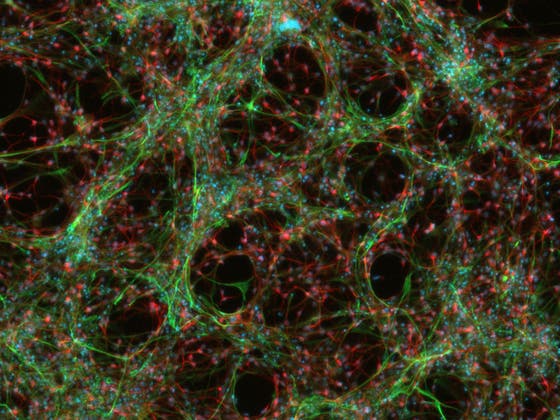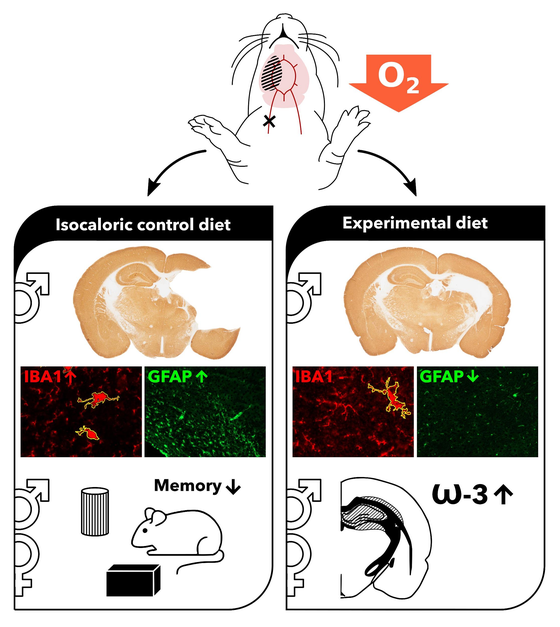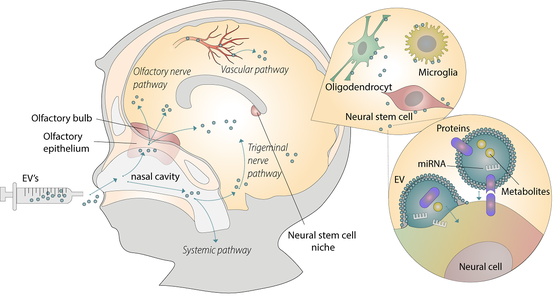Nutraceuticals for the developing brain
We focus on how adverse early life events (such as brain injury and preterm birth) compromise brain development and we aim to develop therapeutic strategies. Since the brain is the body’s highest energy consumer and the neonatal brain undergoes a rapid pace of growth in the first 1000 days of life, early life nutrition is crucial for healthy brain development. In our group, we study the effects of nutrition on brain development and the potential to use early life nutraceuticals to improve neurodevelopmental outcome after neonatal brain injury.

Do nutraceuticals boost neuronal network formation in vitro? MAP2-postive neurons are stained in red and GFAP-positive astrocytes in green. Courtesy of Federica Ruggeri.
In particular, we investigate the neuroprotective effects of human milk components for preterm infants, with a specific focus on human milk oligosaccharides (HMOS). By taking a bench-to-bedside approach, we study the therapeutic effects of HMOS in animal models for encephalopathy of prematurity and in preterm infants we aim to link neuroprotective human milk components to neurodevelopmental outcome.

A DHA-supplemented diet reduced lesion size and neuroinflammation specifically in males. In both sexes, brain n-3 fatty acids were increased after receiving the experimental diet. The experimental diet also improved novel object recognition, but no significant effects on motor performance were observed. Current data indicates that early life DHA supplementation may provide neuroprotection after perinatal HI.
Another important component of human milk, docosahexaenoic acid (DHA) is an important building block for the brain. DHA serves an important role in axonal outgrowth and synaptogenesis of neurons, particularly during the first 1000 days of life. Therefore, we investigate the therapeutic effects of DHA on neonatal brain injury, as sole therapy, and also in combination with regenerative therapies with the aim to provide building blocks to repair the injured brain (see also the research line Regenerative strategies for the injured neonatal brain).

The effects of (milk-derived) nutrients and bioactive compounds on important processes for brain development that unfold during the neonatal period. HMOs = human milk oligosaccharides, MSCs = mesenchymal stem cells. ©Drawing by Nynke van de Haar, copyright permission has been obtained. Courtesy of Myrna Brandt.
In addition to nutritional building blocks, milk contains components that play an active role in the regulation of the development of the new-born. One of these bioactive components are cell-derived extracellular vesicles (EVs), which are vehicles for cell-cell communication. Milk EVs are interesting candidates for therapeutic application as they have anti-inflammatory and regenerative capacities and have the potential to cross the blood brain barrier. In this ZonWM OPEN funded project, we aim to decipher the anti-inflammatory and regenerative effects of milk EVs on the injured preterm brain and investigate their therapeutic potential. Taking a bench-to-bedside approach, we will investigate in vitro functional effects and targeting of milk EVs to different neural cell types and connect these findings to the milk EV cargo analyzed by multi-omics approaches in order to unravel the molecular mechanisms of milk EV communication to neural cells. In vivo, the migratory capacity of milk EVs and therapeutic efficacy of intranasal milk EV administration will be determined in a preclinical mouse model for preterm brain injury. In the clinic, we will assess the feasibility ofintranasal administration of mother's own EV-containing milk plasma in preterm infants with brain injury (post-hemorrhagic ventricular dilatation) and investigate the effects on neuroinflammatory and neuroregenerative markers in cerebrospinal fluid. We expect these mechanistic, efficacy, and feasibility studies on milk EV-neural cell communication to deliver a protocol for the first-in-human efficacy trial to define the effects of intranasal milk EV therapy on preterm brain injury.

Overview of the postulated intranasal routes of milk EV delivery to the brain, neural target cells, and EV cargo that could promote neural cells to protect the brain from EoP in preterm infants.
Key publications uitklapper, klik om te openen
- Brandt MJV, Nijboer CHA, van Elburg RM, Benders MJNL, de Theije CGM. Nutritional supplementation for the prevention and treatment of neonatal brain injury: Breast milk and beyond. Book chapter 46: 1. In Martin Patel, Preedy (Ed.), Nutrition and Neurological Disorders. Academic Press Books. In press Elsevier, 1st edition.
- Brandt MJV, Nijboer CH, Nessel I, Mutshiya TR, Michael-Titus AT, Counotte DS, Schipper L, van der Aa NE, Benders MJNL, de Theije CGM. Nutritional Supplementation Reduces Lesion Size and Neuroinflammation in a Sex-Dependent Manner in a Mouse Model of Perinatal Hypoxic-Ischemic Brain Injury. Nutrients. 2021, 14(1):176.
- Vaes JEG, Brandt MJV, Wanders N, Benders MJNL, de Theije CGM, Gressens P, Nijboer CH. The impact of trophic and immunomodulatory factors on oligodendrocyte maturation: Potential treatments for encephalopathy of prematurity. Glia. 2021, 69(6):1311-1340.
- Hortensius LM, van Elburg RM, Nijboer CH, Benders MJNL, de Theije CGM. Postnatal Nutrition to Improve Brain Development in the Preterm Infant: A Systematic Review From Bench to Bedside. Front Physiol. 2019, 10:961.
- de Theije CG, Wopereis H, Ramadan M, van Eijndthoven T, Lambert J, Knol J, Garssen J, Kraneveld AD, Oozeer R. Altered gut microbiota and activity in a murine model of autism spectrum disorders. Brain Behav Immun. 2014, 37:197-206.
Funding & Grants uitklapper, klik om te openen
- ZonWM OPEN competition (2022): Breast milk extracellular vesicles for baby brains (EV4BB): Deciphering and exploiting the anti-inflammatory and regenerative effects on brain cells
- TKI Health Holland (2019): Human Milk Oligosaccharides for the prevention of white matter injury in extreme preterm infants
- Public-Private partnership (2017): Neurotrophic dietary supplementation for the treatment of neonatal brain injury in mice
- WKZ Research Fund (2017): Advances in cell-based therapy for the injured newborn brain: Optimizing nurture, habitat and momentum of mesenchymal stem cells
Contact uitklapper, klik om te openen
PI's: Caroline de Theije and Cora Nijboer
Dr. Caroline de Theije, personal profile page
Email: C.G.M.deTheije@umcutrecht.nl
LinkedIn page
Dr. Cora Nijboer, personal profile page
Email: C.Nijboer@umcutrecht.nl
LinkedIn page, follow Cora on Twitter
